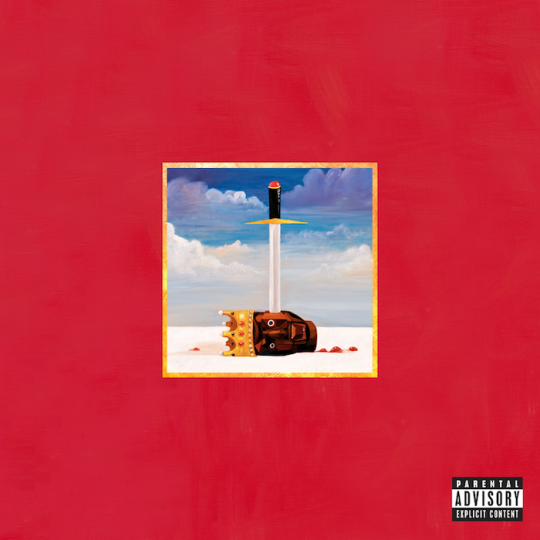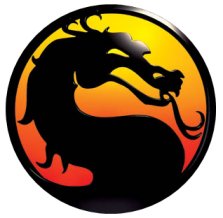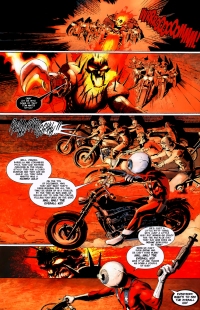
“I ain’t a killer, but don’t push me.”
January 18th, 2011 Posted by david brothersThe Damon Albarn Appreciation Society is an ongoing series of observations, conversations, and thoughts about music. Here’s the second:
Let’s talk about The 7 Day Theory, even though everyone just calls it Makaveli. It’s twelve tracks long, just shy of a full hour, and his best record.
1) “Intro/Bomb First (My Second Reply)” – I learned recently that Tupac would record his vocals three times and layer all of those on the track. This was so that if he missed a word in one take, he’d probably get it on the second, and maybe do it better on the third. I don’t know the term for this (“wall of sound”?), but it makes Makaveli sound very full and very, very messy. It’s overflowing with Tupac, basically. You can sometimes hear the differing takes floating below the final track, like ghosts.
You can even hear it on this intro. The church bells, the news report, heartbeat, and the dense background noise all stack up. It’s intense, and what really blows my mind is the transition from introduction to the actual song around 1:20. Everything builds to a crescendo before dropping out in favor of the church bells, and then the song comes in. The heartbeat becomes part of the beat, becoming a more traditional drumbeat, and then a gunshot heralds the arrival of Makaveli the Don. Tupac’s flow is fast, but he puts so much emphasis on every word that you can’t help but keep up.
2) “Hail Mary” – The church bells make a return, providing continuity between “Bomb First” and “Hail Mary.” This time, they stick around, and are accompanied by light keys.
There aren’t many rap songs with a better first two bars than “Hail Mary.” “I ain’t a killer but don’t push me/ Revenge is like the sweetest joy next to gettin pussy” is top 5 dead or alive material, and when you consider that “Hail Mary” is about being damned, it takes on new meaning. This isn’t about killing your enemies and glorying in your victory. It’s about being hopeless because you stepped on a path and you couldn’t get off it if you tried. It’s not a prayer so much as a confessional, and the lines between traditional Catholicism and the black family twist and blur over the course of Tupac’s verses.
When he says, “Institutionalized, I lived my life a product made to crumble/ But too hardened for a smile, we’re too crazy to be humble, we balling” he’s talking about how playing a role can remove you from happiness. It’s the price of fame–you get what you want, but you can’t even enjoy it. You revel in it, and you ball out of control, but you can’t smile any more.
The Outlawz go in on this, but Young Noble almost steals the song. “Peep the whole scene and whatever’s goin on around me/ Brain kinda cloudy, smoked out feelin rowdy/ Ready to wet the party up, and whoever in that motherfucker” The flow is on point, and he’s just the personification of what Tupac is talking about. He’s lost and he knows it.
3) “Toss it Up” – Tupac took a sex song that was intended for a K-Ci & Jojo album, added another verse dissing Dr. Dre and an outro manhandling Puffy, and put it on Makaveli. That same trio had rocked “How Do U Want It” earlier, and what’s funny is that he did the same thing there. He dissed Bob Dole and C Delores Tucker in verse two and talked about his demons in verse three, and bam, out.
But really, that was Tupac. He could spit something grimy over a smooth beat, and it would all work. Something for the thugs and something for the ladies, all in one song. It shouldn’t work, but it’s that “understandable smooth shit that murderers move with.” You want to know where 50 and Ja Rule got their style from? This song right here.
4) “To Live & Die in L.A.” – This is one of four love songs on Makaveli, and the first of two dedicated to inanimate objects. But really, “To Live & Die In LA” is like Jazzy Jeff and Fresh Prince’s “Summertime.” It’s just a smooth joint you put on at a cookout or when chilling and reminisce. It’s about belonging somewhere, loving your people, and repping for your home.
What I like is that Tupac isn’t even from LA. He was born in Harlem, lived in Baltimore, moved to Marin City as a kid, repped the Bay Area for years, and then he made his way south as an adult. LA is his adopted home, but it’s clear he loves it anyway. That’s a good feeling, I think.
5) “Blasphemy” – There are a lot of references to God and religion throughout this album, from the provocative cover art down to “Hail Mary” and “Blasphemy.” It’s usually pitched from a position of mistrust or confusion. He constantly blurs the line between God and a father, absentee or present, and rather than being a comfort, religion is something that’s unknowable and scary.
Tupac often dealt with fatalist themes, and this song just might be the peak of it. If you turn this one up, you can hear Tupac harmonizing in the background, just below the bass. It sounds sad,
6) “Life of an Outlaw” – “The shit you heard ain’t do me justice–got a death wish, bitch!”
The reason why Tupac clicked with so many people probably comes down to a few things. He wasn’t the most lyrical rapper, and Biggie definitely wins on that front, but Tupac was a guy who used charisma, rhythm, and emotion to pull you in. Tupac understood the importance of playing a role and acting in rap music. He could mix something deeply personal with something that was straight up false, and it would still come off true.
It wasn’t about faking, or exploiting a lifestyle you didn’t belong to. It was more like he wanted to represent every aspect of black culture so that he could reach as many people as possible. So he had the songs dedicated to death obsession, screwing women, loving women, guns, and black power. He talked about pain and fame in equal parts, and it worked. Everybody loved him, “from the hood to the burbs.” Tupac, to an extent more than probably any other rapper, represented us. He ran up and down the spectrum of black experiences in his songs, and he did it in a way that everybody kept the volume knob turned all the way up.
7) “Just Like Daddy” – Love song number two, and the only one that’s just a straight up traditional joint. This is Tupac and the Outlawz in a “Dear Mama” mode. It’s sweet and protective, but also apologetic. There’s this strain of guilt that runs through Tupac’s library, and it tends to go hand-in-hand with loyalty.
It’s about sticking by your people, especially through the rough times. It’s about knowing better, but falling short, and getting another chance to do things right. Tupac’s verse is about a woman sticking by her man while he’s in jail and him promising to stick by her.
The sweetness is all in the chorus. Do people still call into radio shows to dedicate songs to their girls? This is more “Summertime” music.
8) “Krazy” – One of the illest, and most true, lines on 36 Chambers came from Deck on “CREAM.” “Though I don’t know why I chose to smoke sess/ I guess that’s the time when I’m not depressed/ But I’m still depressed, and I ask what’s it worth?/ Ready to give up so I seek the Old Earth/ Who explained working hard may help you maintain/ to learn to overcome the heartaches and pain.”
It’s a verse that I think represents a lot of what I feel like it’s like to be black in America. Tupac’s “Krazy,” then, takes those six bars and blows them out into a full-blown song. Every single line is rings true, from trying to escape from real life with drugs or drink, trying to do right by your mom, and, no matter what, feeling like you don’t belong. Bad Azz drops the best verse of his career…
“Krazy” is one of the most melancholy songs I know. It’s just about getting by. Life goes on.
9) “White Man’z World” – Love song number three, this time to his people.
On “Bomb First,” Tupac talks about how he’s down to “murder motherfuckers lyrically, and I’m not gon’ cry.” When he’s talking about love, black people, or his family, he cries. He says, “Dear sister, got me twisted up in prison, I miss ya/ Cryin lookin at my niece’s and my newphew’s picture.” On “Krazy,” he mentions crying for weeks after getting a letter from his sister Sekyiwa.
Crying doesn’t really fit the media narrative of Tupac. You’d think he was Alpha Male Plus if you judged him by the papers. To them, he was the guy who came through and wrecked New York nearly singlehandedly, in between preying on women and running wild in the streets. But no, that really wasn’t it. This song alone puts the lie to it. Tupac was raised by Black Panthers. He knows what he’s talking about, and there’s been a strong pro-Black theme running through most of his albums.
This is another one of those songs that’s both universal and personal. That second verse is lethal.
“Proud to be black, but why we act like we don’t love ourselves?/ Don’t look around busta (you sucka) check yourselves!/ Know what it means to be black, whether a man or girl/ We still struggling, in this white man’s world.”
10) “Me and My Girlfriend” – Love song number four, this time to his pistol.
This one is just an eternal banger, from Lady of Rage to the hook to the concept.
This is where the layered vocals come back in a big way. If you turn this one up loud with some good earphones, you can hear the vocal tracks slipping and sliding up against each other, particularly on the chorus. You can hear these alternate Tupacs behind every line, sometimes synchronized, sometimes off just a little bit, and sometimes just emphasizing a single word.
It makes “Me and My Girlfriend” sound like a ghost story, like Tupac is haunting his own song. It makes a song that’s just dope into something that’s real, real creepy. There’s a reverb (or reverse?) effect around some of the lines and chorus, too, which only adds to the effect. Tupac’s earnest personification of the gun as the only girl he loves and the implications of the hold it has over him is powerful stuff.
What’s more is the fact that, alongside guilt, the idea of being trapped is something that has been deep inside Tupac’s lyrics, ever since the beginning.
11) “Hold Ya Head” – This pro-black joint is like “Krazy,” but even more obvious in its meaning. It’s also another price of fame song, as Tupac relates how going hard at all times and making money cost him friends and happiness. He knows that people would lock him up forever if they could, but he also knows that he couldn’t stop if he wanted to.
It’s as much an encouragement and advice to others as a message to himself. His advice at the end, about how no matter how hard it gets, you need to do whatever you need to do to hold your head, are all things he did himself.
12) “Against All Odds” – “Hit ‘Em Up” was nice, but “Against All Odds” is the nail in the coffin. Mobb Deep, Jay-Z, and everyone else are treated as less than potholes in Tupac’s path in “Against All Odds”. He’s left the buckshot blast of hate that was “Hit ‘Em Up” behind in favor of something new: “Plan, plot, strategize, and bomb first.” It’s an updating of his THUG LIFE (The Hate U Give Little Infants Fucks Everybody) and NIGGA (Never Ignorant, Getting Goals Accomplished) credos. You think it through first, and then you destroy whatever stands in your way.
This song puts every major figure in New York on blast in a such an amazing way that its only competition is “Ether” or “Takeover”, and those are a distant, distant second and third. This is just a straight up, no frills diss song–“this is why you’re wack.” He calls Nas out on biting Rakim’s style before dissing and dismissing Mobb Deep in two lines. He creates what is hands down the best line in a diss song ever when he says that De La Soul is “looking like Larry Holmes, flabby and sick.”
Makaveli began with church bells and ends with the sounds of war. There’s something meaningful lurking behind that, isn’t there? I don’t know.



